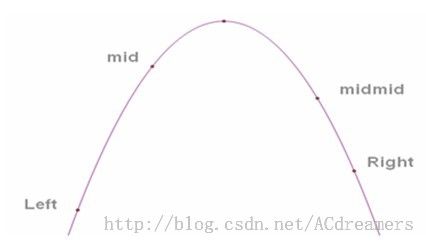【单峰函数,三分搜索算法(Ternary_Search)】UVa 1476 - Error Curves
Josephina is a clever girl and addicted to Machine Learning recently. She pays much attention to a method called Linear Discriminant Analysis, which has many interesting properties.
In order to test the algorithm's efficiency, she collects many datasets. What's more, each data is divided into two parts: training data and test data. She gets the parameters of the model on training data and test the model on test data.
To her surprise, she finds each dataset's test error curve is just a parabolic curve. A parabolic curve corresponds to a quadratic function. In mathematics, a quadratic function is a polynomial function of the form f(x) = ax2 + bx + c. The quadratic will degrade to linear function if a = 0.
It's very easy to calculate the minimal error if there is only one test error curve. However, there are several datasets, which means Josephina will obtain many parabolic curves. Josephina wants to get the tuned parameters that make the best performance on all datasets. So she should take all error curves into account, i.e., she has to deal with many quadric functions and make a new error definition to represent the total error. Now, she focuses on the following new function's minimal which related to multiple quadric functions.
The new function F(x) is defined as follow:
F(x) = max(Si(x)), i = 1...n. The domain of x is [0, 1000]. Si(x) is a quadric function.
Josephina wonders the minimum of F(x). Unfortunately, it's too hard for her to solve this problem. As a super programmer, can you help her?
Input
The input contains multiple test cases. The first line is the number of cases T (T < 100). Each case begins with a number n(n ≤ 10000). Following n lines, each line contains three integers a (0 ≤ a ≤ 100), b (|b| ≤ 5000), c (|c| ≤ 5000), which mean the corresponding coefficients of a quadratic function.
Output
For each test case, output the answer in a line. Round to 4 digits after the decimal point.
Sample Input
2 1 2 0 0 2 2 0 0 2 -4 2
Sample Output
0.0000 0.5000
题意:给出n条二次曲线S(x) = ax2 + bx + c(a >= 0, 0 <= x <= 1000),定义F(x)=max{Si(x)},即F(x)为取x值时n条二次曲线对应值的最大值;则你需要求出x在[0, 1000]范围内F(x)值的最小值;
分析:x在[0,1000]范围内所有F(x)值可以连成一条曲线。由于每条二次曲线S(x)都是下凸单峰函数,则F(x)=max{Si(x)}的曲线也是下凸单峰。对于单峰函数求极值,一般选用三分搜索算法。
所谓三分:把区间分为长度相等的三段进行查找,称为三分查找,三分查找通常用来迅速确定最值。


1 #include<iostream> 2 #include<cstdio> 3 #include<cstdlib> 4 #include<cmath> 5 #include<algorithm> 6 using namespace std; 7 const double eps = 1e-14; 8 const int maxn = 10010; 9 int a[maxn], b[maxn], c[maxn]; 10 int n; 11 12 double F(double x) 13 { 14 double ans = a[0]*x*x + b[0]*x + c[0]; 15 for(int i = 1; i < n; i++) 16 { 17 ans = max(ans, a[i]*x*x + b[i]*x + c[i]); 18 } 19 return ans; 20 } 21 22 23 void Ternary_Search() 24 { 25 double L = 0.0, R = 1000.0; 26 for(int i = 0; i < 100; i++) 27 { 28 double m1 = L+(R-L)/3; 29 double m2 = R-(R-L)/3; 30 31 if(F(m1) < F(m2)) R = m2; 32 else L = m1; 33 } 34 printf("%.4lf\n", F(L)); 35 } 36 int main() 37 { 38 39 int T; scanf("%d", &T); 40 while(T--) 41 { 42 scanf("%d", &n); 43 for(int i = 0; i < n; i++) 44 scanf("%d%d%d", &a[i], &b[i], &c[i]); 45 46 Ternary_Search(); 47 } 48 return 0; 49 }
